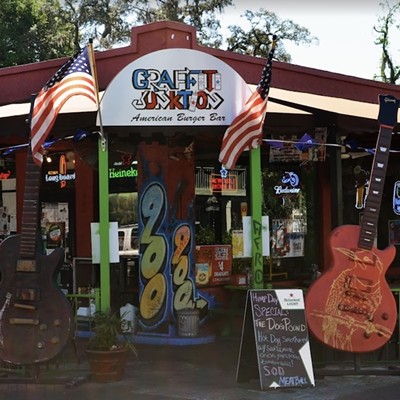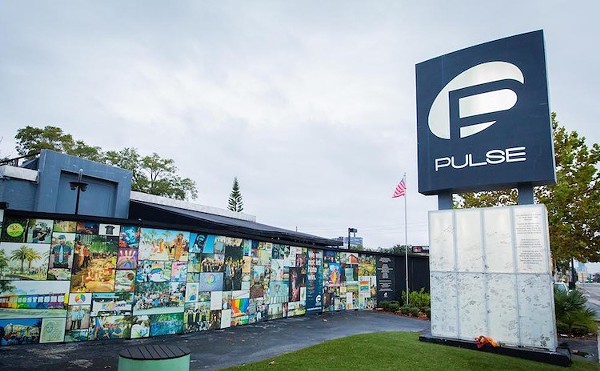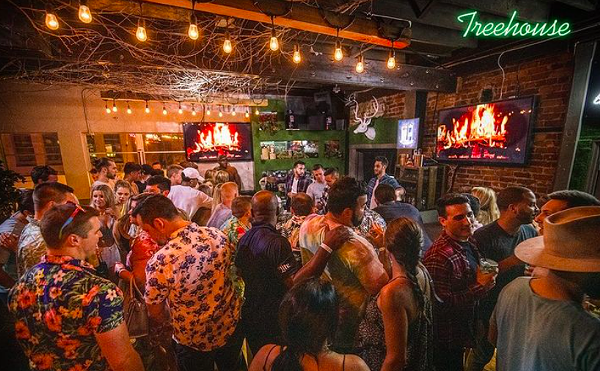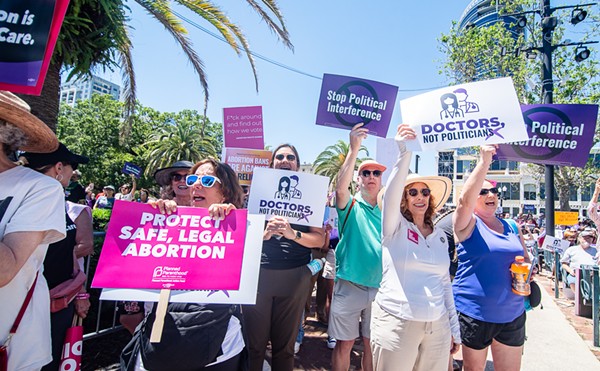As Gay Days 2003 comes on strong, there's a sense of the history building for the event now in its 13th year. There are bigger-than-ever expectations for topping last year's turnout of 125,000 people, an all-time record. Pat Robertson be damned, rainbow flags are waving strong. Economists be damned, the money is green, and there's plenty of it being infused back into the community.
This year's June 3-8 lineup reaches one of its high points on closing night with "Climax II," the Jeffrey Saenger rave on Disney grounds. Such a debacle on Mouse property could be seen as a sign of some kind of apocalyptic change in Orlando world, but it's more of a matter of competitive niche marketing. After all, Disney should be able to cash in, even peripherally, on the "unofficial" status it's played in the annual show of gay arms. What started as a one-day red-shirted bonding session in the Magic Kingdom is now a weeklong string of revelry with parties and men, men, men all over town. Everyone makes out -- the visitors and the businesses that entertain them.
Meanwhile, as it has since 1975, The Parliament House, the down-and-dirty diva of the gay nightclub scene, plays on.
♦ ♦ ♦
A call to the Orange County Regional History Center in search of local gay history brings the same result as an inquiry specifically about The Parliament House: There's nothing on file, reports the efficient researcher. Furthermore, she's lived here all her life and never heard of The Parliament House -- what is it, anyway?
Likely, there are many other town natives, mostly straight folks, who don't know about this chapter of alternative-lifestyle lore. That's the way it's supposed to be. What goes on there is hardly a secret, but there's no intrusion into the mainstream consciousness. It's a wink-wink proposition: Don't ask, don't tell.
But I asked and heard from the locals who remember a history, rich with characters and drama. The story of The Parliament House is a colorful visit to the clothesline, an airing of loads of gossip that has been hanging around forever, it seems, in the unconnected perspectives of the people who call the club home.
To understand the true legacy of The Parliament House, however, one must first understand the inherent shroud of secrecy in gay life -- too much exposure means somebody might know something and everybody might lose, with casualties not limited to jobs, partners, money, freedom and dignity.
"Gay sex thrives in a furtive, clandestine, out-of-the-way setting," says Jay, an insider of Orlando's gay community for more than a decade. "The Parliament House provided that and to an extent, I suppose, still does for some people."
By sharing this very story, there's a risk of disturbing the status quo. But ultimaely, The Parliament House is a story of a permissive sexual environment. That is what defines The Parliament House.
"There are lots of gay nightclubs and resorts in the country that cater to ages and behaviors and tastes, but there are very few places where you can have a drink, dance the night away and then bed the partner or partners of your choice, all on the same property," says Jay.
♦ ♦ ♦
In 1975, in a climate of sexual revolution soundtracked by flirty disco, seductive drugs of every variety and no AIDS in sight, William Miller and Michael Hodge -- Bill and Mike, then 42 and 31, Virgo and Leo -- took over the drug-and-prostitute ridden Parliament House Motor Inn.
Snugged between Rock Lake and Orange Blossom Trail, the motel was a leftover from the pre-Disney days of the 1950s and 1960s when travelers made their way by automobile through town via the Trail, seeking fishing spots and sunshine. It was after Disney arrived and the big I-Drive hotels took away the legitimate travelers that the area grew seedy.
Miller and Hodge were lovers when they bought The P House, but soon their relationship evolved into an enduring business partnership. Miller was the tight-fisted money man; Hodge was the personality, the people person who was much more obviously gay than Miller. They had bought and sold several other gay establishments in town, and were supported by a gay subculture that was active even back then, though not advertised. They were gay; and they were opportunists.
The duo's names were attached to The Palace Club and Diamond Head (on the second floor of the old Opera House on Court Avenue). Then there was the Loading Dock, "where they built the bar on the loading dock of the old dairy ... right next to the old Gary's Duck Inn," remembers Peter Thornly, 60, owner of the Rainbow City gay bookstore on Mills Avenue. He says, "They were pioneers."
The boss men were "Mr. Miller and Mr. Hodge" to Paul Wegman, aka Miss P, The Parliament House's witty and wildly talented resident drag queen who put the place on the map for its gay entertainment from the get-go. Wegman, now 59, put P out to pasture in July 2000 for personal reasons. But he's still an adored celebrity at the Parliament House and on the drag circuit.
As Wegman tells it, in 1975, there was only one other gay establishment, in Miami, that was similar to The Parliament House, with a hotel in a resort area. "We were the first two places in the country where people could come here and stay for a week and didn't have to deal with straight people, and that was like, 'Oh my god.'"
"The P House was fantasyland; it was like Disney World for gays," says Wegman. And what would become the infamous (and still active) balconies of the motel were crowded with men on the prowl for consensual sex.
Miller, a very private man who kept a very low profile, was building a profitable portfolio of real estate in the area, including bars, motels and trailer parks. The experienced entrepreneur and landlord owned and rented the properties, with a constant turnover of buy and sell, but he never wore his wealth on his sleeve. His attitude between the gay and straight communities was one of, "We don't need to be a problem to them, and they don't need to be a problem to us," says Wegman.
When Miller died of AIDS in 1987, at age 53, his real-estate holdings were valued at $1 million, with an additional $50,000 in personal property. He left his Winter Park condo to his parents from Titusville, a few cash gifts to friends, and the rest went to Hodge.
But there was a twist in the will. Michael Hodge's brother Sammy Hodge, married and living in Lakeland, was designated as the administrator of the estate, though very few people knew that. Miller's stipulation was not difficult to understand: Michael Hodge was dying of AIDS. From the time of Miller's death until Hodge's own in 1992, The Parliament House was a reflection of the changing times. AIDS was still a mystery but definitely tied to promiscuous gay sex and drug use. Still, it didn't stop the party. And Hodge pretty much partied until the end, perhaps generous to a fault toward his people.
Here's a paragraph from the memorial published in the January 1993 issue of the monthly Triangle, the gay publication that preceded Watermark:
"Mike was one of the greatest supporters of gay and lesbian life that Orlando has ever had. His aid to groups like Hope and Help, CENTAUR, Act-Out Theatre and all of the other of our institutions is legendary. And, he gave hope and encouragement constantly to individuals who needed help, as well as to the groups that we all turn to for socializing, entertainment, and most importantly, for medical assistance. He was always reaching into his deep pockets to help people, whether it be to pay overdue rent or electrical bills or whatever.'"
♦ ♦ ♦
When Michael Hodge died, he left almost everything to his family, who took care of him to the end. His probate file is sealed, however, leaving exact details and distributions closed to public eyes. The real problem was that the family comprised his mother and 13 brothers and sisters, all born and raised and saved in religious Crossville, Tenn., right in the middle of the scenic Cumberland Plateau. Luther Hodge Sr. and wife Cora Izora (who passed away only last year at age 92) were part of the Cumberland Homesteads project of the 1930s set up by Roosevelt to help out-of-work miners. They were tough stock and straight arrows and gifted breeders.
Though he lived and had a job in Lakeland, Sammy Hodge was tasked with the business responsibilities of The P House, as well as keeping the family happy with profits back home. Gone were the personal investment and involvement of Michael Hodge. And if the family was conflicted about the gay nature of Michael's legacy, the patrons of The Parliament House were conflicted about having owners who were not in the life.
Next door to The Parliament House is the Full Moon Saloon, a more masculine, leather/biker gay bar, once owned by Michael Hodge and bequeathed to Robert Graves -- not the property but the business itself -- who is still the proprietor. This part of the story has been pieced together through several recollections, but most agree that the relationship between the two men soured toward the end of Hodge's life as he wasted away. Graves, who lived in a grand house across the lake from the club, apparently felt that he was owed more than just the saloon. He boarded up an opening between the two sister properties, which had previously shared clientele and still does. To this day an acrimony between Graves and The Parliament House continues.
Through the latter part of the 1990s, The Parliament House suffered from lack of cash flow, the property deteriorating as well as the clientele. Hustlers and drifters of all types were entrenched in the surrounding area, which was plagued with criminal activity. The Parliament House balconies were accessible to these undesirables. To visit the the club could be dangerous just getting from the parking lot to the inside, but it was still wildly popular.
♦ ♦ ♦
In August 1999, the estate of Michael Hodge finally sold The Parliament House to a straight couple, Don Granatstein and Susan Unger. No one knew what to expect. There was a surety that the private gay enclave would never be the same.
"They're not that straight," says Wegman, with a twinkle in his eye. "They just have too much fun to be straight." They are infectiously fun. And smart with numbers and people.
Toronto natives and Jewish, Granatstein and Unger worked their way to Orlando via Las Vegas, where they were involved with the now-defunct Debbie Reynolds hotel and time share, as well as other hospitality-type businesses, including a casino.
They came to Orlando in search of a time-share project and ended up with The Parliament House and its environs, including the strange piece of attached property called the Carolina Moon Cottages and trailer park. It's on that piece of antiquated property that their $20 million Parliament House Resort time share will be built. The ground-breaking could occur later this year but more likely the summer of 2004.
"It's going to look like South Beach," says Granatstein, who has a healthy cap of white hair and a deep tan that he earns playing tennis three times a week, and a hint of a Canadian accent. The Art Deco plans call for every building to be a different color. There's going to be five buildings, plus a health club with 564 units total. There is an architectural rendering on the website (parliamenthouse.com), but that's already been changed several times over, laughs Granatstein.
Gay time share as a whole is in its early stages of development. In this effort, Granatstein and Unger will be pioneers, much like Miller and Hodge.
"On a small scale, I know that somebody tried to do it in Miami Ã? but nothing of this magnitude," he says.
Certainly, the buying power of the gay population has been harnessed to a profitable end.
Results of the Eighth Annual Gay & Lesbian Travel Survey released these statistics last month: "The majority of travelers surveyed are in committed relationships, fell between the ages of 35-50, hold college or post graduate-level degrees, have incomes ranging from $40,000 to $74,000, are in a professional or executive position in their careers, and are comparatively -- and increasing -- computer and Internet savvy."
Orbitz, a leading online travel company, reports that, "Gay and lesbian travelers represent a valued, lucrative market for travel and leisure companies. They are seven times more likely than the average consumer to take six or more flights in one year and are twice as likely to spend more than $5,000 on one trip."
So while there's money to be mined in the gay niche market, "We like it better than anything we've ever done," says Granatstein. "We like the guys. This is the nicest community we've ever worked with. Whenever we fixed up other places, people would say, 'You've done something nice, thanks.' With these guys, they said, 'Thanks for fixing up our home.' And it touched us and made it all worth while."
The new owners also believe in one thing, no matter what. "We always give back to the community -- if you support us then we support you."
And local gay organizations from Tom Dyer, publisher of the Watermark newspaper, to Bob King, the administrator for the financially struggling Center (formerly the Gay Lesbian & Bisexual Community Center) praise the owners for sharing and supporting myriad gay outreaches.
The fixing-up tallies to an investment of about $2 million so far. This is where Unger's taste has been influential. The place was dirty and falling apart, she remembers, and everything was black -- "something about gay men hiding," she says. Besides the new linens and painting of everything, she started to really decorate, like the Jewish mother (and grandmother) that she is.
After almost four years under her meticulous watch, The P House is clean and inviting. The on-site Rainbow Cafe is open 24 hours a day with respectable service and serves a mean prime rib.
Unger's crowning achievement, however, is the "courtyard." Shortly after buying the property, she cemented in the parking lot between the motel and the swimming pool so the property looks and feels more connected and expansive. "My courtyard," she calls it.
On a visit to The Parliament House over the Memorial Day weekend, the courtyard was decked out for a special beach party, with painted surfboards and wakeboards and other beachy touches. There were vintage cars and vintage motorcycles that roared into action, along with a variety of fun and games topped by guest drag queen Pepper Mashay's saucy act.
The cover was $10, and that's something that Unger is fussy about, too. "I know how much money the people make who come to my club, and I know I need to keep the cover charges low." Average nights find the cost of admission around $5 to $7. "There's nobody who can touch the quality of entertainment we offer here for such a reasonable price."
The inside entertainment, too, can always be counted on, with the nightly drag shows in the disco. There's also the Footlight Theater, once Paul Wegman's domain, but now shaped by local gay actor and radio personality Michael Wanzie. The popular production of "Hedwig and the Angry Inch" starring David Lee, graces the stage there for several special Gay Days performances June 4 and 5.
Interestingly, Wanzie's right now writing a show called "Carolina Moon: A Campy Trailer Trash Tragedy," which will open in August. He remembers and has interviewed some of the former residents, who were displaced when the Granatstein and Unger took over and emptied the odd lot.
Sitting in the middle of last weekend's beach party, though, the lure of sex was everywhere, as men of every shape and size, with libidos and sexual preferences to match, were cruising up and down the motel's walkways and balconies. The tension was palpable. But overall, the atmosphere is safe and encouraging to dance and drink and just have fun under the stars.
The Parliament House is safe these days. Sergeant Orlando Rolon, the information officer for the Orlando Police Department, reports that the club is considered a good partner in the business community. He says there are no more calls to The P House than there are to any other business in the area. He praises the owners for their grip on security. And he credits his department's special task force with cleaning up the area around the club.
There is a general consensus among the gay community that the new owners have been a blessing. The improvements speak for themselves. The story of The Parliament House, it seems, has come full circle. From popularity to decline and back on top again.
The Cyndi Lauper/Amber concert that headlines The P House's festive Gay Days lineup is the most ambitious party the owners have taken on to date. They are building a special outside stage and pulling out all the stops.
"This will be the biggest party for The P House ever," says Granatstein.
A photo of Michael Hodge sits above the bar, and Granatstein says that if the former owner were alive today, he'd say, 'Thank you. I think we've tried to carry on what they started."


















